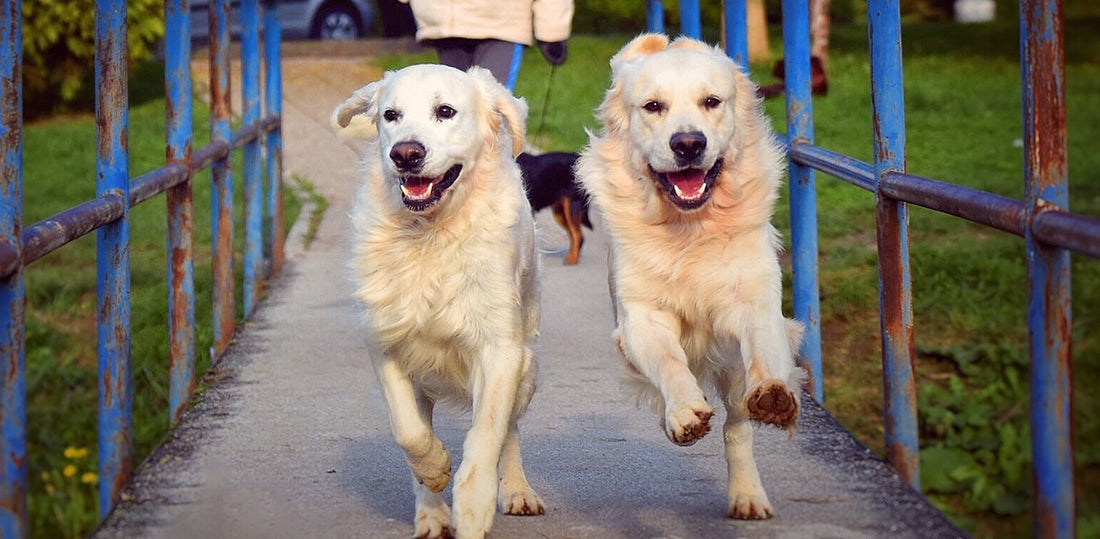
Does Your Dog Really Need the Bordetella Vaccine? What to Know About Kennel Cough and Safe Alternatives to Vaccination
Share
If you have an active and social pup, especially one who frequently interacts with other dogs, then you may already be familiar with kennel cough (“infectious tracheobronchitis,” or more simply, Bordetella). In fact, most daycares, groomers, kennels, and vets will either recommend or require that your dog have her Bordetella vaccine before entering their care.
But when making important decisions for your furry companions, it’s important to keep in mind all the factors behind recommendations such as vaccines. For instance, does your dog really need the Bordetella vaccine? Are these places of business protecting themselves against certain liabilities? Both?
Of course, there’s a lot more to consider—what kennel cough is, the effectiveness (and potential hazards) of the vaccine, and the safe alternatives of treating a pup with kennel cough or preventing it. And as always, Homescape Pets is deeply invested in helping you make the right decisions for your pets.

What to Know About Kennel Cough
For starters, don’t let anyone scare you: not only is kennel cough common, but it is often compared to the cold in humans. That means that for an otherwise healthy dog, recovery is only a matter of time and proper care. You should be concerned if your dog is immunocompromised or is a very young puppy. Otherwise, the worst-case scenario of death is actually quite rare.
Kennel cough is an upper respiratory condition that can exhibit the following symptoms:
- Dry cough
- Hacking
- Sneezing and/or snorting
- Gagging or vomiting from triggering the gag reflex
-
Runny nose
That’s right… very much like the human cold. These symptoms will usually appear 2-14 days after exposure. In most cases, dogs with kennel cough will not experience a lack of appetite or any other symptoms, and will usually stay active and alert.
Kennel Cough Causes
Like most respiratory illnesses, kennel cough is highly contagious and transmitted from pup to pup: through the air by other dogs who are sneezing or coughing. Sometimes, there are certain factors that can make your dog more susceptible to the bacteria, like traveling, cold temperatures, being in a shelter or boarding facility, and environmental factors like pollutants in the air.
There are many causes of kennel cough, the main cause being the Bordetella bronchiseptica bacteria. But it’s important to note that kennel cough is usually accompanied by other viruses—making kennel cough a bit more complicated to prevent than a vaccine would have you believe.
The Truth About Bordetella Vaccines
As we mentioned, kennel cough is a complex combo of different bacterial or viral agents, and the vaccine only protects against a few of them. That means that there’s a good chance that the Bordetella vaccine may be ineffective in preventing kennel cough in your dog. Think about it: why don’t humans have a vaccine for the cold?
Not only that, but most Bordetella vaccines wear off in less than a year, meaning your pup can be exposed to more stressors with annual and routine vaccinations. And your dog’s immune system can only handle so much!
Here’s another hard-hitting fact about the vaccine: there is no current evidence to suggest that frequent Bordetella vaccination is medically necessary. When you think about the potential risks with the vaccine (your dog exhibiting kennel cough symptoms after vaccination, elevated histamine levels that can trigger other illnesses, etc.), you may want to start exploring safer alternatives.
Boarding, Daycare, and Groomers
Due to how easily Bordetella is transmitted from dog to dog, many boarding facilities, daycare centers, kennels, and groomers require dogs to be vaccinated prior to arriving. This helps protect them from liability should a dog come down with Bordetella and has a difficult time fighting it off. This may happen with dogs who are elderly, recently ill or have weakened immune systems. By insisting on the Bordetella vaccine, these businesses are attempting to reduce the chance of infection and provide a safe environment for all dogs.
If your dog does not have the vaccine, some facilities will allow you to sign a waiver indicating that you understand the risk of exposure and that you assume full responsibility for the decision not to give the kennel cough vaccine. Be sure to speak to the facility about their position on waivers at least 1 week prior to the day your pet is scheduled to arrive there. If your kennel, daycare, or groomer will not accept a waiver, and your dog must have the vaccination, we recommend asking your veterinarian for the less toxic intranasal/mucosal vaccine instead of the injectable.
Alternatives to Giving Your Dog the Bordetella Vaccine
The good news is, there is evidence that has seen dogs who have never been vaccinated for kennel cough live long, healthy lives without coming down with the disease. How can your pup be one of them? Here are some ways to naturally prevent kennel cough:
- Pre & Probiotics: Prebiotics help nourish and support probiotics, the good bacteria living in your pup’s gut. But not only do pre and probiotics help your dog’s digestive health, but they are also both great supports for a healthy immune system. Good digestion means your dog is getting all the nutrients and minerals he needs out of her diet to have an immune system in excellent working condition… which includes preventing kennel cough and other diseases.
- Mushrooms: It’s no secret that we love medicinal mushrooms. In fact, we wrote a whole blog post about them! Reishi mushrooms and cordyceps, in particular, provide excellent immune-boosting properties. They are also antiviral, antibacterial, antifungal, and help protect the liver, heart, and lungs.
- Herbs: Okay, so we also love herbs, and have another blog post dedicated to them, too! The reason why is for the awesome immune-boosting benefits they provide, especially echinacea and rosehips. Echinacea, in particular, can also help support the reduction of cancer cell growth.
- Homeopathic Nosodes: Nosodes are remedies administered by holistic or integrative practitioners and are completely safe. Unlike traditional vaccines, there are no dangerous chemicals or additives and they are administered orally rather than via injection.
Another safe alternative in addition to the ones we’ve mentioned is our Calming Relief Hemp & Turmeric Oil for Pets. Hempseed oil promotes a healthy immune system as well as enhances organ function. And if your pup is already suffering from kennel cough, he will appreciate the soothing effects of turmeric, which also supports her immune system.
And whether or not you decide the Bordetella vaccine is right for your pup, interaction with other pets is often unavoidable. Sometimes you have to leave him at the doggy daycare, or maybe the dog park is busier than usual! In these cases, trying Restful Pet along with Calming Relief will give your dog the dynamic combination of all-natural, all-safe supplements to help keep him relaxed… and happy!

5 comments
Thanks for this. Very helpful perspective and info.
Thanks for sharing your knowledge!
Hey Donna & all other readers,
Thanks for reading our blog post on the Bordetella vaccine for dogs. To answer your question, Bordetella vaccines can take up to 72 hours to become effective. However, if your dog is older and has NEVER been vaccinated for Bordetella, it can take up to 10 days for them to have immunity.
Keep in mind that each pup is different and you should always check with your veterinarian about vaccines and their effectiveness.
Thanks again!
Nana
Co-Founder, Homescape Pets
How soon after the vaccine is it effective?
Can I give my dog calming relief hemp with turmeric oil, or restful pet being he’s 18months and is on medication for seizures. He gets really excited, and I feel that is a trigger for his seizures. I need something to calm him but not to make him feel drugged up. Thanks